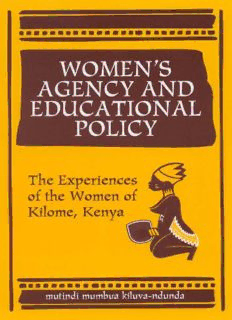
Women's Agency and Educational Policy: The Experiences of the Women of Kilome, Kenya PDF
Preview Women's Agency and Educational Policy: The Experiences of the Women of Kilome, Kenya
Women’s Agency and Educational Policy SUNY series, The Social Context of Education Christine E. Sleeter, editor Women’s Agency and Educational Policy The Experiences of the Women of Kilome, Kenya mutindi mumbua kiluva-ndunda STATE UNIVERSITY OF NEW YORK PRESS Published by State University of New York Press, Albany © 2001 State University of New York All rights reserved Printed in the United States of America No part of this book may be used or reproduced in any manner whatsoever without written permission. No part of this book may be stored in a retrieval system or transmitted in any form or by any means including electronic, electrostatic, magnetic tape, mechanical, photocopying, recording, or otherwise without the prior permission in writing of the publisher. For information, address the State University of New York Press 90 State Street, Suite 700, Albany, NY 12207 Production by Kristin Milavec Marketing by Anne M. Valentine Library of Congress Cataloging-in-Publication Data Kiluva-Ndunda, Mutindi Mumbua. Women’s agency and educational policy : the experiences of the women of Kilome, Kenya / Mutindi Mumbua Kiluva-Ndunda. p. cm. — (SUNY series, the social context of education) Includes bibliographical references (p. ) and index. ISBN 0-7914-4761-8 (alk. paper)—ISBN 0-7914-4762-6 (pbk. : alk. paper) 1. Women—Education—Social aspects—Kenya—Kilome. 2. Education and state—Kenya—Kilome. 3. Women—Kenya—Kilome—Social conditions. 4. Kilome (Kenya). I. Title. II. SUNY series, social context of education. LC2474.2 .K54 2001 305.42'096762—dc21 00-020576 CIP 10 9 8 7 6 5 4 3 2 1 (cid:1)(cid:1)(cid:1)(cid:1)(cid:1)(cid:1)(cid:1)(cid:1)(cid:1)(cid:1)(cid:1)(cid:1)(cid:1)(cid:1)(cid:1)(cid:1)(cid:1)(cid:1)(cid:1)(cid:1)(cid:1)(cid:1)(cid:1)(cid:1)(cid:1)(cid:1)(cid:1)(cid:1)(cid:1)(cid:1)(cid:1)(cid:1)(cid:1)(cid:1)(cid:1)(cid:1)(cid:1)(cid:1)(cid:1)(cid:1)(cid:1)(cid:1)(cid:1)(cid:1)(cid:1)(cid:1) Contents (cid:2)(cid:2)(cid:2)(cid:2)(cid:2)(cid:2)(cid:2)(cid:2)(cid:2)(cid:2)(cid:2)(cid:2)(cid:2)(cid:2)(cid:2)(cid:2)(cid:2)(cid:2)(cid:2)(cid:2)(cid:2)(cid:2)(cid:2)(cid:2)(cid:2)(cid:2)(cid:2)(cid:2)(cid:2)(cid:2)(cid:2)(cid:2)(cid:2)(cid:2)(cid:2)(cid:2)(cid:2)(cid:2)(cid:2)(cid:2)(cid:2)(cid:2)(cid:2)(cid:2)(cid:2)(cid:2) Preface ix 1 Introduction 1 Main Focus, 1 Background, 3 Overview of the Book, 5 2 Education and Women’s Equity: Framing the Context 7 Women and Education in Kenya, 8 Women’s Economic Activities, 13 Women and the Family, 17 Women’s Self-Help Groups, 20 Conclusion, 22 3 Research Sites 25 Kithumba Village, 27 Kyandue Village, 29 Salama Town, 31 Choice of Study Area, 34 Participants, 36 4 Grounding the Methodology of Study 39 Paving the Way: Theoretical Framework, 40 Research Design, 46 Writing Ethnography, 48 Reflections on Doing Research in Kilome Division, 49 v vvii (cid:1)(cid:1) PCroenftaecnets 5 Analyses of Education- and Development-Policy Documents 55 Ominde Report (1964), 59 Sessional Paper # 10: African Socialism and Its Application to Planning Policy (1965), 61 1974–1978 Development Plan, 63 Gachathi Report (1976), 64 Mackay Report (1981), 67 Wanjigi Report (1982–1983), 69 Kamunge Report (1988), 71 1989–1993 Development Plan, 72 Ndegwa Report (1991), 73 Conclusion, 76 6 Kilome Women’s Educational Experiences 83 Colonial Background, 84 Women’s Own Experiences of Education, 85 Educational Experiences of Kilome Women’s Daughters, 94 Conclusion, 97 7 Factors Limiting Girls’ Educational Opportunities 101 High Cost of Education, 102 Traditional Preference to Educate Boys, 105 Assumption That Girls Will Get Married, 106 Girls’ Potential Motherhood, 109 Responsibility for Sex Education, 112 Poverty, 114 Conclusion, 116 8 Intensification of Women’s Labor to Educate Their Children and Its Implications 119 Importance Women Attach to Educating Daughters, 120 Supporting Their Mothers, 121 Supporting Their Families, 122 Making Marriage Choices, 123 Women’s Inability to Depend on Husbands for Daughters’ Education, 126 Intensification of Women’s Labor, 128 Women’s Health, 135 Girls’ Education, 137 CPonretefanctes (cid:2)(cid:2) vviiii Impact on the Welfare of the Family, 138 Conclusion, 138 9 “Help Me So That I May Help You”: Women’s Self-Help Movement 141 Kyandue Women’s Self-Help Group, 143 Kithumba Women’s Self-Help Group, 147 Salama Women’s Self-Help Group, 149 Successes and Limitations, 150 Exclusiveness of Women’s Self-Help Groups, 151 Conclusion, 153 10 Women’s Educational Experiences: Private and Public Discourses on Education in Kenya and Implications for Policy 155 Public and Private Discourses on Education, 155 Implications for Policy, 164 Support for Girls’ Education Starting at the Village Level, 168 Reentry of Adolescent Mothers into the School System, 168 Introducing Sex Education in Schools and Communities, 169 Support for Women as Intervention Agents for Their Daughters’ Education, 170 Conclusion, 171 Notes 173 Bibliography 179 Index 189 (cid:1)(cid:1)(cid:1)(cid:1)(cid:1)(cid:1)(cid:1)(cid:1)(cid:1)(cid:1)(cid:1)(cid:1)(cid:1)(cid:1)(cid:1)(cid:1)(cid:1)(cid:1)(cid:1)(cid:1)(cid:1)(cid:1)(cid:1)(cid:1)(cid:1)(cid:1)(cid:1)(cid:1)(cid:1)(cid:1)(cid:1)(cid:1)(cid:1)(cid:1)(cid:1)(cid:1)(cid:1)(cid:1)(cid:1)(cid:1)(cid:1)(cid:1)(cid:1)(cid:1)(cid:1)(cid:1) Preface (cid:2)(cid:2)(cid:2)(cid:2)(cid:2)(cid:2)(cid:2)(cid:2)(cid:2)(cid:2)(cid:2)(cid:2)(cid:2)(cid:2)(cid:2)(cid:2)(cid:2)(cid:2)(cid:2)(cid:2)(cid:2)(cid:2)(cid:2)(cid:2)(cid:2)(cid:2)(cid:2)(cid:2)(cid:2)(cid:2)(cid:2)(cid:2)(cid:2)(cid:2)(cid:2)(cid:2)(cid:2)(cid:2)(cid:2)(cid:2)(cid:2)(cid:2)(cid:2)(cid:2)(cid:2)(cid:2) T his book is about women’s perception of education and the sacrifices they make to afford their children meaningful edu- cational opportunities. It focuses on the educational experi- ences of the women of Kilome, Kenya. Contrary to the public dis- course on the education of women articulated in Kenyan policy documents, women’s private discourses on education emphasize higher education as the key to self-reliance for their children. The sacrifices that women make to achieve higher education are many. For me, the ultimate sacrifice was leaving my two young children—a two year old and a three year old—to pursue a master’s degree in Canada. The joy of winning a prestigious Canadian In- ternational Development Agency (CIDA) scholarship was shrouded by the reality of this sacrifice. It was very difficult for me to reconcile the contradictions of motherhood and the development of my career. For a woman to leave her young children to pursue her education abroad was a choice that few Kenyan men and women accepted. However, grow- ing up in a polygamous home, I knew how important it was for a woman to have something that she could call her own. Education was that “something” that could give a woman economic indepen- dence. I decided to develop my career unlike my mother, who was compelled to support my father’s career development only to lose control over the benefits of his career when he became a “modern polygamist.” Traditionally, the first wife chose her cowife/wives and had control over the family’s resources. The journey of my education begins with my mother, who like many mothers in my village, valued the education of all her chil- dren irrespective of their gender. She enrolled me in school when I became of age and made sure that I was fed, clean, and had all ix
Description: